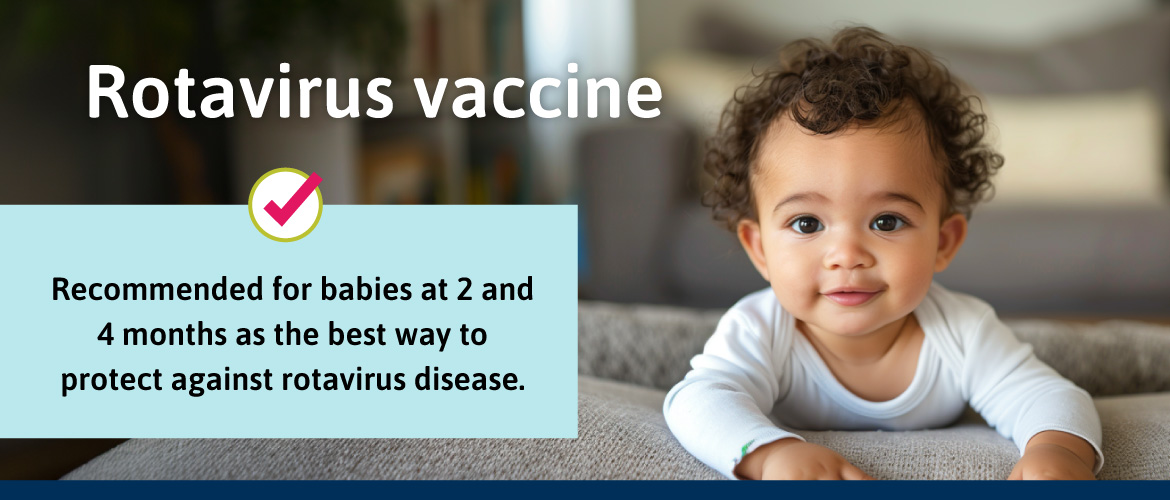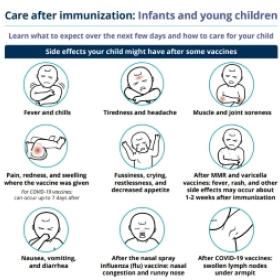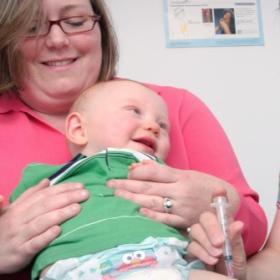Date last reviewed:
Tuesday, May 28, 2024
HealthLinkBC
Available in 简体中文 (Simplified Chinese), 繁體中文 (Traditional Chinese), یسراف (Farsi), 한국어 (Korean), ਪੰਜਾਬੀ (Punjabi), and other languages.

Disease it protects against
The rotavirus vaccine protects against:
- Rotavirus
Rotavirus is a virus that causes gastroenteritis, sometimes called the stomach flu. Children who get rotavirus disease can become dehydrated and may need to be hospitalized. Learn more about rotavirus.
Fact
Did you know?
Rotavirus is the most common cause of diarrhea and hospitalization for diarrhea in children under 5 years of age. Almost all unimmunized children will have at least 1 rotavirus infection before they turn 5.
Who should get the vaccine
| Age | Schedule |
|---|---|
| Infants |
|
The vaccine is given by putting drops in your baby’s mouth. It is given at the same time as other childhood immunizations.
How well it works
The vaccine prevents more than 3 out of 4 cases of rotavirus disease and almost all severe cases, including hospitalizations.
When you get your child immunized, you help protect others as well. People who are immunized are much less likely to catch a preventable disease and spread it to others.
Fact
Did you know?
Before a vaccine was available, many children who became ill with rotavirus were hospitalized. Nowadays, very few vaccinated children are hospitalized because of rotavirus illness.
Safety
Vaccines are very safe. Getting the vaccine is much safer than getting one of the diseases. Vaccine safety is a top priority in Canada, and every vaccine must be shown to be safe and effective before it is approved for use in Canada. After approval, the safety of vaccines is continuously monitored. Learn more about vaccine safety.
Side effects
Many people have no side effects from vaccines. For those that do, they are usually mild and go away on their own within a few days. Serious side effects are very rare.
Most babies do not have any side effects after they get the rotavirus vaccine. Some may have:
- Diarrhea.
- Crankiness.
- Stomach pain.
- Gas.
- An itchy rash.
In some countries outside of Canada, a very rare risk of intussusception (a blockage of the intestine) has been seen in the week after the first dose of rotavirus vaccine.
- The risk of intussusception is about 1 to 2 cases for every 100,000 babies that get the vaccine. At most, this could affect 1 baby a year in BC.
- By comparison, each year in BC, about 1 in 4,000 children under the age of 1 get intussusception without having received the vaccine.
Signs of intussusception may include a swollen abdomen, frequent vomiting, and bloody stools. Your baby could seem weak and irritable and have several bouts of intense crying. If your baby shows these signs, you should take your baby to the nearest emergency department.
How to manage side effects
For information on how to manage side effects, view the immunization aftercare sheets below.
Who should not get the vaccine
Talk to your health care provider if your baby:
- Has had a life-threatening reaction to a previous dose of rotavirus vaccine or any component of the vaccine
- Has an immune system weakened by disease or medical treatment
- There is a family history of weakened immune systems
- Had intussusception or has an intestinal disorder that may result in intussusception
Babies who have moderate or severe diarrhea or vomiting or a serious illness should not be immunized until they have recovered from their illness.
There is no need to delay getting immunized because of a cold or other mild illness. However, if you have concerns, speak with your health care provider.
Rotavirus quick facts
- What it is
-
Rotavirus is a virus that causes gastroenteritis, sometimes called the stomach flu. Rotavirus is the most common cause of diarrhea and hospitalization for diarrhea in children under 5 years of age. Almost all unimmunized children will have at least 1 rotavirus infection before they are 5 years of age.
- How it spreads
-
Rotavirus is easily spread through touching the stools of an infected child. This can happen when handling diapers. Washing your hands often with soap and water is the best way to prevent the spread of rotavirus. A child who is sick with diarrhea or vomiting should not go to daycare or have contact with other children until 48 hours after the diarrhea or vomiting has stopped.
- Symptoms and risks
-
The first symptoms of rotavirus infection are often fever and vomiting, followed by diarrhea and stomach pain. These symptoms appear 1 to 3 days after a person has been infected with the virus. Diarrhea can last from 4 to 8 days.Young children can become dehydrated if the diarrhea or vomiting is severe and happens often. If this is not treated, the child may die.




